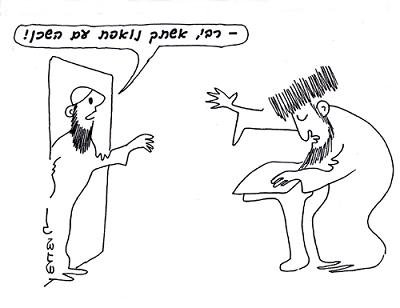
During the era of the Talmud the text of the Mishnah was not yet written down; it was still transmitted orally by the scholars. For this reason there are sometimes errors involving letters which sound similar, such as a confusion of the letters bet and pay [a confusion which persists to this day amongst the Arabs]. Therefore, though the Mishnah cites a law in the name of Rav Zechariah son of Kabutal, the scholars said the name as Kaputal while before their teacher, Rav. When Rav heard this he signaled to them that they should have said Kabutal with a bet and not Kaputal with a pay. This incident was related in the study halls from generation to generation until later scholars asked why Rav gave a hand signal instead of verbally correcting his students. Answer: Rav was busy reciting the Shema and he was forbidden to talk, so he made a signal. The scholars then asked: If Rav were busy reciting the Shema, he would have been forbidden to even make a hand signal, for a different sage said that one who is reciting the Shema may not wink his eyes, mouth words, or make gestures with his fingers. Answer: The prohibition against making hints in the middle of reciting the Shema is during the first paragraph, when it is important to intend and concentrate on the meaning. Rav made his hint while reciting the second paragraph, during which there is no obligation to intend or to concentrate on the meaning.
(Babylonian Talmud, Tractate Yoma 19b)
